Rules “Tough Enough” As Infections Fall

The Government appears to have noticed that infections are on the decline and pulled back from threats of stricter measures. The Telegraph has the details.
Priti Patel said on Tuesday night that the lockdown rules are tough enough as it emerged that the weekly number of people testing positive for Covid had fallen for the first time in two months.
The Home Secretary said ministers and police were focused on improving public compliance with the regulations rather than any immediate toughening of measures. It comes amid signs of lockdown fatigue and concerns about people exploiting loopholes over exercise.
A new analysis revealed that lockdown laws have changed 65 times since March, prompting warnings by lawyers and police of confusion among the public and even officers charged with enforcement.
Speaking at a Downing Street press conference, Ms Patel said police had ramped up enforcement in the current lockdown with 1,000 people a day being fined since December 30th, bringing the total to 45,000 since the start of the pandemic.
Asked why the rules were not as tough as they had been in the March lockdown, the Home Secretary said: “The rules are clear, the rules are firm in terms of staying at home.
“The rules are tough enough – you’ve already heard 45,000 fixed penalty notices have been issued just in the recent time since we’ve been in this pandemic. All rules are under review constantly within Government, but currently we are focusing very much on compliance and enforcement.”
The Department for Education has also confirmed face masks will not be compulsory in classrooms.
Fears about NHS pressure appear to have shifted away from London now, with Chris Hopson, chief executive of NHS Providers, saying yesterday that pressure on the NHS is unlikely to peak until the middle of February, with problems likely to be particularly acute in the Midlands, North West and South West. One hospital in Birmingham has cancelled all elective surgery and moved 200 doctors to intensive care duties in anticipation of an influx.
Lockdown Sceptics‘ senior doctor, who reports on the state of play in hospitals, sent this missive:
1. Admissions from community falling over last four days. NB this cannot be attributed to lockdown starting on January 5th – more consistent with ZOE app data [see below].
2. Total inpatients falling less – implies they can’t discharge effectively to home/care home (see FT article the other day) or the in-hospital infection rate is higher than they are admitting (or both). Consistent patterns across all regions – not just London.
3. ICU numbers still rising a little (but virtually flat) – expected as there is a 48 hour lag between admission and need for ICU, and ICU patients stay longer so the curve takes longer to come down.
4. I expect the thing that is stressing them most now is the non-Covid stuff, which is always higher at this time of year anyway.
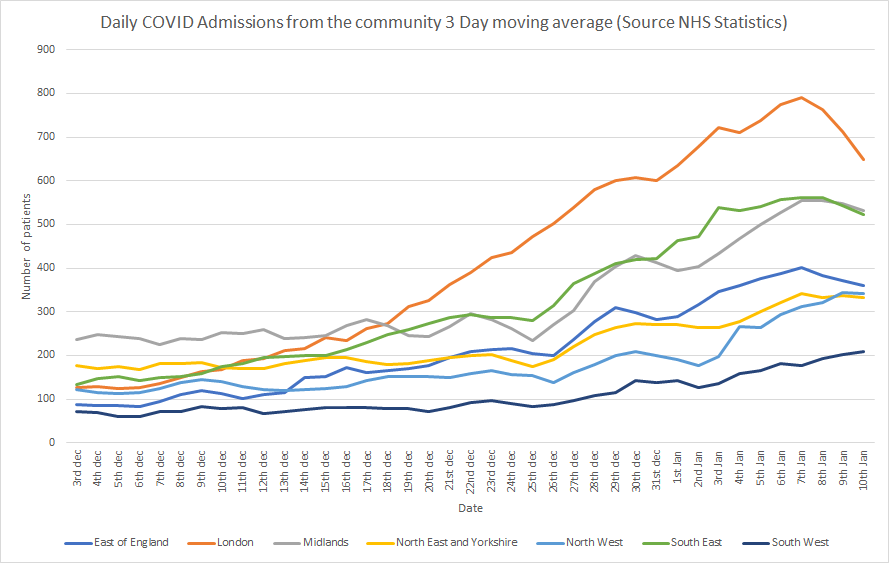
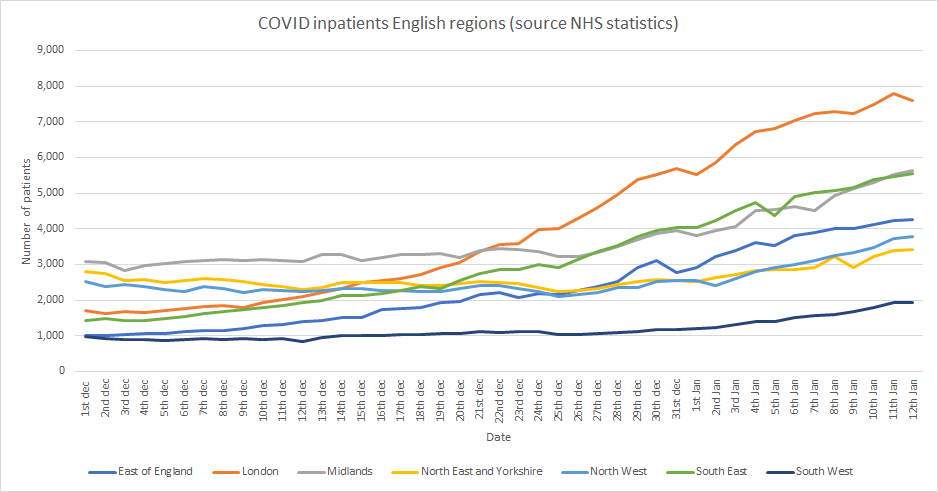
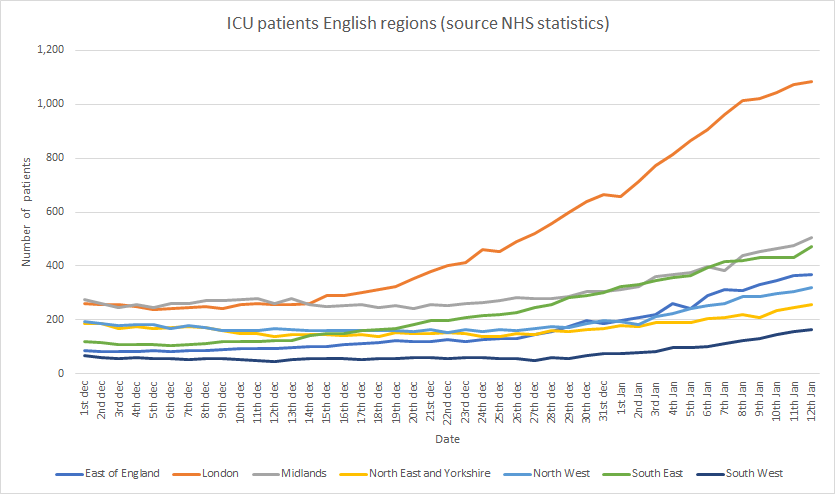
999 Covid triages/journeys in the capital were also down to just 12 on Monday.
The Daily Mail asks “Did England pass its peak before lockdown?” That’s certainly the impression the ZOE Covid Symptom Study App gives, with the peaks in the UK and England around January 2nd and in London around December 28th.
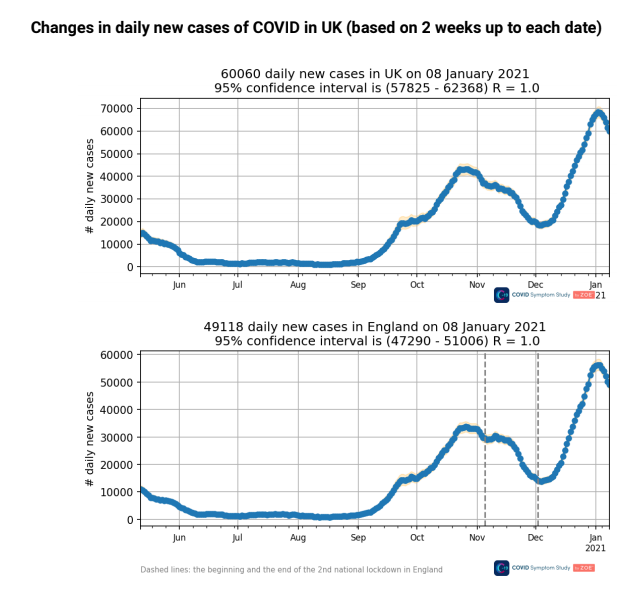
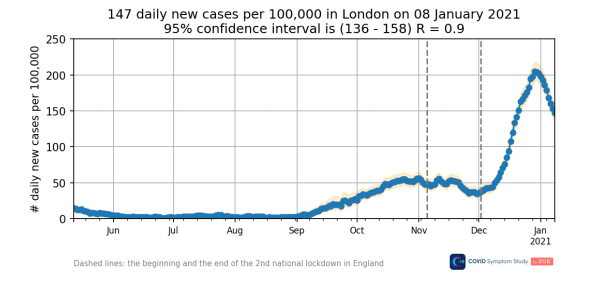
Stop Press: A reader with a background in submarines sent in a neat observation about the importance of looking at all the available data not just a part.
Looking at some of the recent comment, and especially the latest update to the Florence Nightingale plot, considered against the daily ‘Covid death’ figures reminds me of one of the most basic principles of navigation we were taught in the Navy. Typically you look at several different data sources to help locate your position: compass bearing fixes, echo sounder depth etc. compared with the information on your chart. You’re always looking for the different information to agree. The moment something doesn’t tie in with other information you need to have an immediate look to make sure that you are correct in your assessment of your position. These days with permanent GPS plots on electronic charts, there is probably less emphasis on the old fashioned ways, but the parallels with the data hurled at us everyday at the moment is striking. One of the most obvious being the mismatch between deaths declared as Covid and the number of excess deaths based on previous years. Other much more knowledgeable commentators are focused on this of course, but there seems to be a lack of any higher level ‘navigator’ ready to step in and ask why the data isn’t tying together. The suspicion remains, of course, that whoever is being the navigator isn’t sure quite where we are, nor what effect wind and tide are having, never mind the various steering directions and engine orders, and is simply offering data that supports a particular narrative.
2020 saw most deaths since 1918 2008
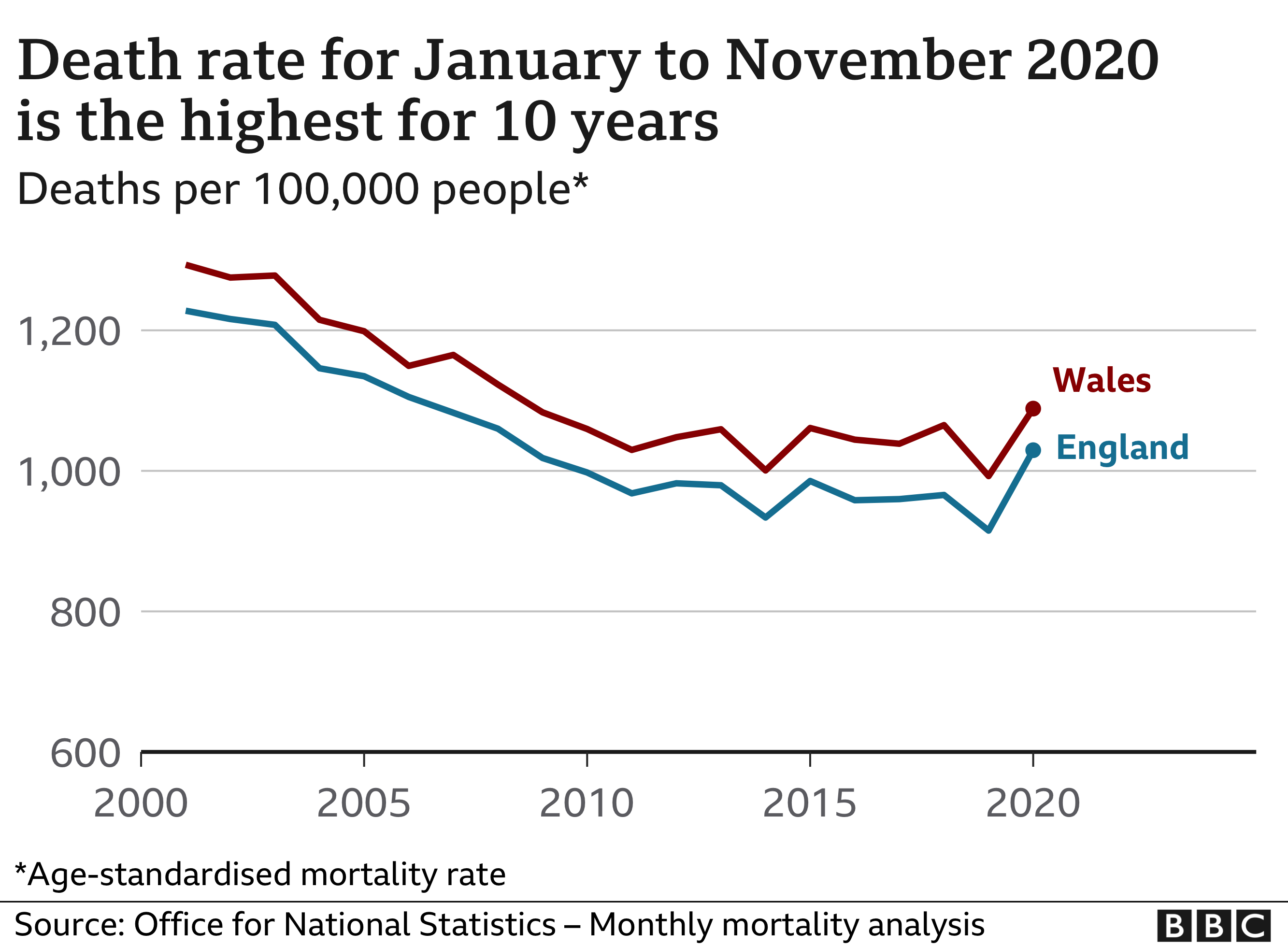
Many outlets including the BBC ran with the headline: “2020 saw most excess deaths since World War Two“. The Guardian went even further: “2020 was deadliest year in a century in England and Wales, says ONS.” This, of course, is just one way of presenting the figures published yesterday, but for some reason it’s the one most of our crisis-loving media put front and centre.
In fact, as Lockdown Sceptics has previously reported, last year was less deadly than 2008 and most years before that. The BBC actually reported this fact, but made sure it was buried beneath the hysteria.
The Covid pandemic has caused excess deaths to rise to their highest level in the UK since World War Two.
There were close to 697,000 deaths in 2020 – nearly 85,000 more than would be expected based on the average in the previous five years.
This represents an increase of 14% – making it the largest rise in excess deaths for more than 75 years.
When the age and size of the population is taken into account, 2020 saw the worst death rates since the 2000s.
This measure – known as age-standardised mortality – takes into account population growth and age.
The data is only available until November – so the impact of deaths in December have not yet been taken into account – but it shows the death rate at that stage was at its highest in England since 2008.
Lockdown Sceptics reader Mark Ellse rewrote this report for the BBC to show what it should have said.
When the age and size of the population is taken into account, despite Covid, the death rate in 2020 is below average for the last 20 years.
This measure – known as age-standardised mortality – takes into account population growth and age.
On one hand, excess deaths are at their highest since World War Two, but once age and size of population are taken into account, 2020 death rates are similar to those in the last 10 years.
Raw death rates, with 697,000 deaths in 2020 seem alarming but our population is larger and older on average and death rates continue to be much less than they were only a decade or so ago.
Death rates fluctuate significantly from year to year. With 2019 having an unusually low rate, a significant increase in 2020 was expected. The ONS figures help put the Covid death toll over the past 12 months in a wider context.
What is clear is that 2020 was not a year in which the death rate was exceptionally large and that public panic over Covid has been misplaced.
The (real) BBC went for comment to King’s Fund Chief Executive Richard Murray:
The UK has one of the highest rates of excess deaths in the world, with more excess deaths per million people than most other European countries or the US. It will take a public inquiry to determine exactly what went wrong, but mistakes have been made. In a pandemic, mistakes cost lives. Decisions to enter lockdown have consistently come late, with the Government failing to learn from past mistakes or the experiences of other countries. The promised ‘protective ring’ around social care in the first wave was slow to materialise and often inadequate, a contributing factor to the excess deaths among care home residents last year. Like many countries, the UK was poorly prepared for this type of pandemic.
Mr Murray appears to be unaware of the peer-reviewed research published in the Lancet showing that lockdown timing was “not associated with COVID-19 mortality per million people“. As for learning from other countries, perhaps we should have learned from hard lockdown countries such as Italy, France and Spain, with Covid mortality scarcely better than ours? Or alternatively from Sweden, which didn’t lock down and kept restaurants, bars, shops, leisure facilities and most schools open throughout the year.
As Lockdown Sceptics reported yesterday, 2020 in Sweden was scarcely more deadly than 2017 or 2018. Furthermore, 2019 was so mild that 2019 and 2020 added together had fewer deaths than 2017 and 2018 added together – and this is before any adjustments for age or population size. In other words, no real excess deaths at all, as this study from the University of Oslo concluded, putting the 2020 extra deaths primarily down to “mortality displacement” or “dry tinder” from 2019.
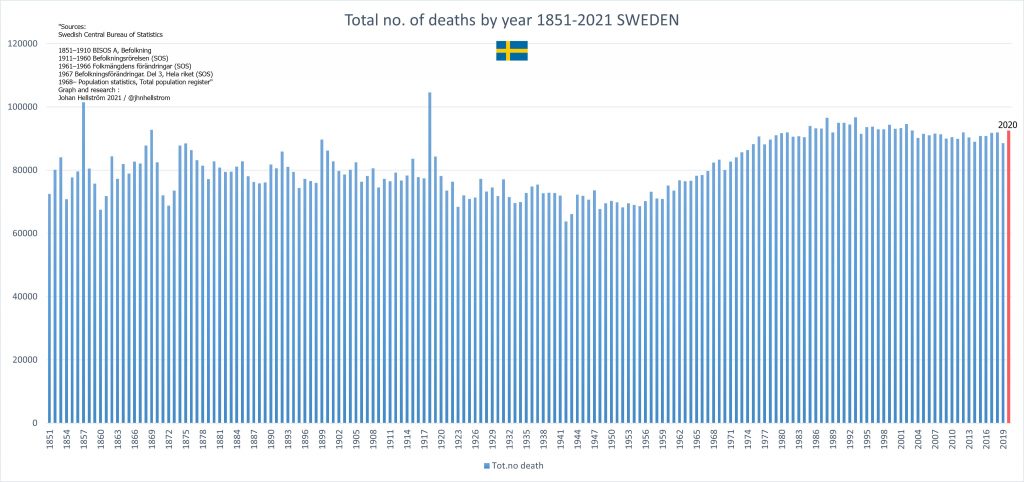
How can this be when Sweden remained largely open while the UK can’t kick its lockdown habit? Perhaps the answer is that lockdown itself kills people, as Recovery explained yesterday in a press release.
Recovery has been warning of this tsunami of excess deaths from Covid policies for months. It’s caused a deadly cocktail of fear, mental health problems, and the denial of vital services to patients in urgent need of life-saving care. For example:
- One in three cancer patients says their treatment has been affected and 70% say their mental health has suffered in consequence. Cancer Research UK says cancer screening was cancelled for three million people and there has been a 39% drop in the seven key diagnostic tests for cancer between March and July – equivalent to 3.2m fewer tests in England alone.
- British Heart Foundation says that excess death from heart disease has risen with a disturbing 13% rise amongst those under 60 even as Covid was declining in May and June. “We believe that delays in people seeking care, coupled with a reduced access to routine tests and treatments during the pandemic, have likely contributed to the rise in excess deaths.”
- A Yonder poll in December revealed that seven out of 10 people in the UK are now seriously worried about the mental health of themselves or someone close. Problem drinking – a killer – has doubled and now affects around 9 million people. Experts report that suicide amongst young people is rising. Rising domestic abuse during the Spring lockdown offences rise by 18,000 between March and June 2020 (ONS 24.11.20).
- Bristol University’s risk experts say that the lockdowns of 2020 will cost 560,000 lives in the UK “because of the deep and prolonged recession they will cause”. The Government’s own prediction last summer was that more than 200,000 will die as a result of the first lockdown alone (ONS July 2020). It has refused to provide an update showing the additional impact of the tiers and lockdowns since.
- Government figures show that even during the Spring peak, restrictions played a huge role in excess deaths. Covid killed 25,000 people but restrictions caused at least 16,000 unnecessary deaths, as 6,000 people died because they didn’t attend A&E through fear and 10,000 people died in care homes because they could not access critical care in hospitals (ONS, August 2020).
- The UN World Food Programme has warned that 270,000,000 people face starvation as a result of the global impact of lockdowns and restrictions. This alone makes the response to Covid the single most lethal policy that Governments have ever adopted, potentially killing many times more than Mao, Stalin and Hitler combined.
Now we can see the combined impact of all this: it’s clear in the figures today and it’s a timebomb – the excess death from fear and restrictions will only grow while current policies continue.
- Before the lockdowns, 9,000 people had waited more than a year for operations. Now it’s close to 200,000. These are not life-threatening conditions, but cause huge pain and misery. Worse, routine problems become life-threatening if left untreated. The problems we already have mean that the NHS will be in crisis for years.
- Each of these people is suffering: so many are in pain, misery, and worse. For many, there is no hope to an end: no indication of a way out. The spiralling backlog of undiagnosed and untreated conditions will see the NHS in crisis for years.
Recovery Campaign Director Jon Dobinson warned that tougher lockdowns, as many are calling for, would only make things worse:
The shocking excess death figures released today have seen hysterical calls for even tougher lockdowns. But that would only make these problems worse. As experts have been warning from the outset, these toxic lockdowns merely kick the can down the road – they postpone problems, they don’t fix them. By prolonging the crisis and extending the period over which deaths take place, they are creating a disaster. We’ll see another easing over the summer, but that will be blamed for worse problems in the NHS by the autumn. As Government experts are already warning, vaccination will not end this – new strains and new pressures will see the deadly cycle continue for years unless we find a better way. Even now, the problems are getting worse. We have to recognise the issue and take urgent action before it spirals even further out of control. The latest NHS data shows even fewer non-Covid patients are now being treated. We’re spending billions on failed policies which have only made the pandemic worse. It’s time for our leaders to acknowledge and address the timebomb of untreated conditions and economic devastation. They are now a terrifying threat to the health and welfare of the UK in themselves. Otherwise, the excess deaths of 2021 and beyond will dwarf even these.
Censorship is Never the Answer
Toby has written a rejoinder to a piece by Conservative MP Neil O’Brien in ConservativeHome calling for the no-platforming of lockdown sceptics.
O’Brien says he’s concerned that British politics will become as polarised and venomous as American politics if the media doesn’t behave more responsibly, by which he means excluding people who express views he considers false and dangerous.
However, there are numerous problems with this censorious attitude, starting with the first question that defenders of free speech always ask: who decides? After all, one man’s conspiracy theory is another man’s inconvenient truth. It’s all very well saying we should ban ‘misinformation’, but these days that’s just a euphemism for ‘a point of view I disagree with’.
Sometimes, the would-be Lord Chamberlains use the phrase ‘hate speech’ to describe the views they think should be censored, but defining which opinions are ‘hateful’ and which merely controversial is notoriously difficult. Last year, I started an organisation called the Free Speech Union, and many of our members have been kicked off social media platforms for breaching anti-hate speech rules, even though their views would be considered perfectly reasonable by ConservativeHome readers.
To give just one example: a trans activist started a petition on Change.org last year demanding that the OED change its definition of woman from “adult human female” to something less “exclusionary” – i.e. delete the word “female”. The feminist campaigner Posie Parker responded by launching a counter-petition on the same platform, asking the OED to retain its definition. Change.org took it down, explaining to Posie that defining a woman as an “adult human female” was “hate speech”.
Lockdown Sceptics – and Toby – are in the Conservative MP’s sights.
In his article, he smears me and the contributors to the sceptical website I run as cranks and conspiracy theorists, lumping us together with Covid-deniers and anti-vaxxers. He even puts inverted commas around the word “scientists”, as if no respectable scientist could be anything other than four square behind the lockdown policy.
This is plainly ludicrous. There are plenty of mainstream scientists, not to mention psychologists, sociologists, economists, historians, philosophers, statisticians, actuaries, financial analysts and novelists – even some Conservative MPs – who believe the harm caused by the lockdowns outweighs the harms they prevent.
They’re not Covid deniers or anti-vaxxers – just people who are sceptical about prioritising saving people from COVID-19 at the expense of everything else, including other deadly diseases, mental health, children’s education, the economy and our civil liberties. Many of them are contributors to Lockdown Sceptics.
O’Brien is perfectly entitled to think this is a dangerous, irrational point of view, just as most of us think his fanatical support for lockdowns is dangerous and irrational. The difference is that we don’t think he should be kicked off Twitter or no-platformed by the mainstream media. We believe in free speech, which means we think the best way to determine when the current restrictions should be lifted – and weigh up the costs and benefits of the lockdown approach more generally – is through vigorous, open debate.
Worth reading in full.
Vaccine Passports On the Way?
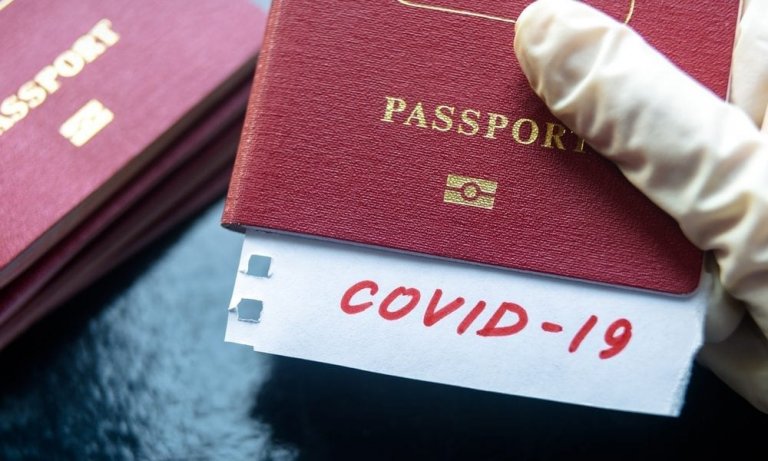
The Telegraph reports on a Government-funded trial being run for an app that allows users to prove they have had the vaccine.
Thousands of Britons who have received their coronavirus vaccine are set to be offered a health passport as part of a government-funded trial taking place this month.
The passport, created by biometrics firm iProov and cybersecurity firm Mvine, will be issued in the form of a free app allowing users to digitally prove if they have received the vaccine.
The trial will be overseen by two directors of public health in local authorities and will be complete in March. However, the locations have yet to be agreed.
Innovate UK, the Government’s science and research funding agency, has pumped £75,000 into the project.
The aim of the trial is to show how the passports can be used to help the NHS keep track of the number of people that have received the first or second dose of the vaccine.
Frank Joshi, director and founder of Mvine, said the company first began working on the passes to demonstrate test results but had since acquired more funding to pivot into vaccination passports.
There are further signs the technology may be in development.
The trials come as the Ada Lovelace Institute launched an evidence review into the use of vaccination passports. The review, which is being chaired by Sir Jonathan Montgomery, will look at the ethics, science, law, and precedence of such passports.
Some fear the passports could discriminate against people who must not be vaccinated, such as pregnant women, who have been advised to date against taking the vaccine. The NHS has said that more evidence was needed on the jabs before they were offered to pregnant women. As a result, women could be restricted from travelling if the passports were to become mandatory.
United Airlines, Virgin Atlantic, Swiss International AirLines, and JetBlue, have all said they would begin offering a health passport system to customers this year. BA-owner IAG is also working on its own healthpass that’s due to launch early this year.
Worth reading in full.
Stop Press: Responding to the story, vaccine minister Nadhim Zahawi sent a reassuring tweet.
How Lockdowns Damage our Immunity

Today we’re publishing a piece by pharmacist and author of Stop Feeding Us Lies Charlie Spedding on the research that shows psychological stress from panic and lockdowns makes viral respiratory diseases worse. Charlie writes:
The advice of Chris Whitty, Patrick Vallance and their team has been consistent. They want to prevent or slow down the spread of the virus with social distancing, closures, restrictions and lockdowns. They originally said there was only very weak evidence for wearing masks but in June, when the virus was at its seasonal low point, face coverings became mandatory. We are now in January, and despite strict lockdowns or tiers since early November, Chris Whitty is telling us that hospitals are about to be overrun with surging COVID-19 cases. He and other members of SAGE are blaming the public for not being fully compliant with the restrictions. We are also told that a mutation of the virus is much more transmissible, and we need harder and longer lockdowns.
A world-wide search of relevant scientific literature paints a different picture. Dr Sheldon Cohen is a Professor of Psychology at the Carnegie Mellon University in Pittsburgh. He has spent over three decades studying the connection between psychological stress and its impact on viral respiratory diseases.1 His research involves a thorough psychological assessment of his volunteers before they are placed in quarantine and exposed to viruses causing influenza or the common cold. The severity of the symptoms suffered by each individual are measured and compared with their pre-infection status. Professor Cohen consistently finds that people with the highest levels of long-term stress suffer more extreme symptoms than those with low levels of stress. He also finds that smoking and low vitamin levels are linked to poor outcomes. Factors associated with decreased risk included social integration, social support, physical activity, adequate and efficient sleep, and moderate alcohol intake.
Worth reading in full.
A Brief Pageant of English Verse

A reader sent us the following poem by an unknown author, which we thought we’d share with you.
I won’t arise and go now, and go to Innisfree,
I’ll sanitize the door-knob and make a cup of tea.
I won’t go down to the sea again; I won’t go out at all,
I’ll wander lonely as a cloud from the kitchen to the hall.
There’s a green-eyed yellow monster to the north of Kathmandu
But I shan’t be seeing him just yet and nor, I think, will you.
While the dawn comes up like thunder on the road to Mandalay,
I’ll make my bit of supper and eat it off a tray.
I shall not speed my bonnie boat across the seas to Skye
Or take the rolling English road from Birmingham to Rye.
About the woodlands just right now, I am not free to go
To see the “Keep Out” posters or the cherry hung with snow
And no, I won’t be travelling much within the realms of gold
Or get me to Milford Haven. All that’s been put on hold.
Give me your hand, I shan’t request, albeit we are friends
Nor come within a mile of you, until this trial ends.
More From the Legal Eagles
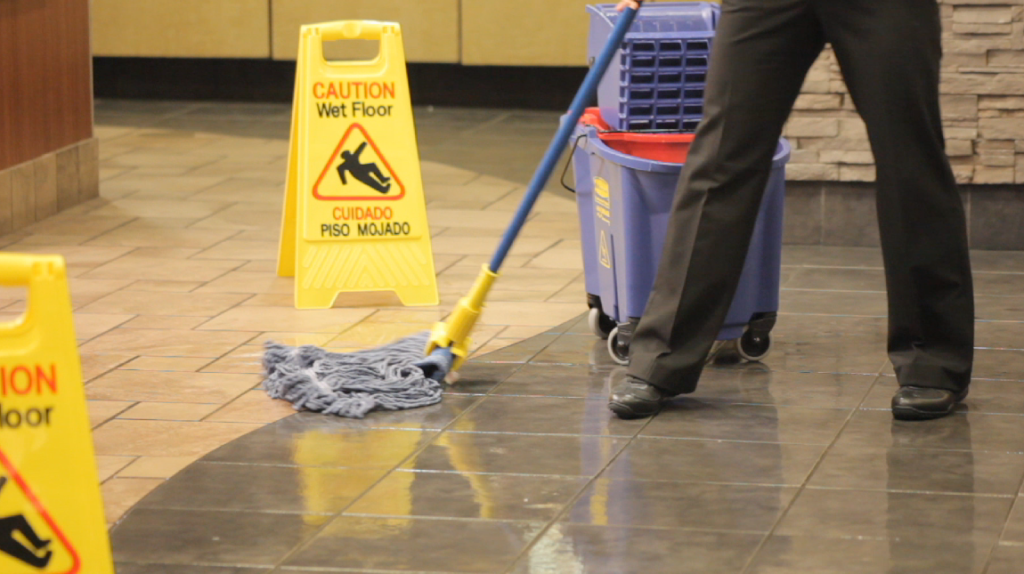
What follows is a guest post by Dr John Fanning, Senior Lecturer in Tort law at the University of Liverpool.
I write with regard to the ‘Question for the Legal Eagles’ you posted on Friday January 8th (‘If basic care is to be curtailed to promote vaccination programmes, can I sue the GP practice if my elderly mum doesn’t get the care she needs and then goes on to be hospitalised unnecessarily?’). I regret that the author of the anonymous reply posted on Saturday January 9th was quicker off the mark than I was. I agree with that person’s conclusions, although would like to add a few further points which may interest your readers.
One of the big unanswered questions of this crisis is whether doctors would be liable in negligence for the injury or damage they may cause by prioritising COVID-19 over everything else. The law has long held that a doctor is not liable if he/she acts “in accordance with a practice accepted as proper by a responsible body of medical [practitioners] skilled in that particular art”. This so-called “Bolam test” has always been overwhelmingly pro-doctor: as long as a doctor acts in a way which a responsible body of professional opinion would endorse, he/she is unlikely to lose. Barring instances of obvious “barn-door” negligence (the surgeon who carelessly leaves his scalpel inside the patient’s body, for example), the injured claimant has it all to do in proving that his/her doctor was negligent. The odds are already stacked against anyone who alleges that he/she was harmed by negligent medical care or treatment.
What is fascinating (and deeply troubling) about the COVID-19 crisis is the extent to which it may have shifted the dial on what “responsible” bodies of medical opinion might endorse as acceptable practice. Horror stories of delayed diagnoses and referrals and inadequate care and treatment for non-Covid conditions abound and yet all this would appear to be, by the logic of a strategy endorsed by the Chief Medical Officer, a by-product of acceptable clinical practice in extraordinary times. It is true that the courts can conclude that a particular practice endorsed by a responsible body of medical opinion is nevertheless ‘illogical’ and, therefore, negligent. But given how little appetite there is to question the logic of lockdown more broadly, this seems unlikely to be a fruitful line of argument. One need only think of the astonishing interview that Hugh Montgomery, an eminent professor of medicine, gave to the BBC – in which he said that people who fail to wear masks and observe social distancing have “blood on their hands” – to appreciate just how far beyond the realm of logic we have travelled over the last 10 months.
This “shifting of the dial” has broader implications for the law’s response to risk. I am reminded of the Latimer case, which was decided in 1953. Exceptionally heavy rains flooded a factory and formed an oily residue on the shopfloor. Faced with what one of the judges later described as an “unprecedented situation” after a “phenomenal storm”, the factory’s owners treated the worst affected areas with their finite supply of sawdust and instructed a team of staff to clean the floor. They followed, in other words, a strategy of “focused protection”. The factory’s owners did not close the factory, preferring instead to continue its operations after taking steps to reduce the risks to its staff. A few hours later, Mr Latimer, a factory employee, slipped on a greasy, untreated surface and suffered injury. He sued the factory owners and argued that a reasonably prudent employer would have closed the entire 15-acre factory site until the risk from the slippery shopfloor was eliminated. Mr Latimer’s claim failed. The court concluded that there was insufficient evidence to prove that the floor was so slippery that a reasonably prudent employer would have closed the factory.
The parallels with COVID-19 and lockdowns are obvious: at the core of the lockdown sceptics’ argument is the same principle that there is insufficient evidence to prove that lockdown is commensurate with the risks posed by COVID-19. Mr Latimer’s case has long been authority for the proposition that defendants in negligence cases can escape liability if they show that they took reasonable steps to minimise risk. In light of the COVID-19 crisis, it is difficult to resist the conclusion that an entirely different calculus now informs our public policy and that, against that backdrop, Latimer is wrong. By the logic of the post-COVID era, the factory should have been closed and perhaps extensively remodelled with drainage designed to cope with extraordinary rainfall and new, non-slip flooring. The factory’s workforce should have been laid off or furloughed until such time as any risk of a slipping injury was eliminated and only allowed to return if they attended work in suitable protective gear. The factory owners should have taken extensive and exhaustive steps, risking bankruptcy for themselves and redundancy for their staff, to eliminate the risk entirely. Until recently, this degree of risk-aversion would rightly have been regarded as overkill; in 2021, it appears to have been recast as the hallmark of reasonable prudence.
Round-up
- “In the Asian Flu of 1957-58, They Rejected Lockdowns” – Jeffrey A. Tucker in AIER takes a look at history to find lockdowns were considered but rejected in the mid-20th century because they wouldn’t work and would be too disruptive
- “Lockdowns Don’t Prevent Coronavirus Spread” – When the mink Covid scare in Denmark caused some municipalities in North Jutland to go into lockdown while others resisted, scientists were provided with the first controlled experiment on the impact of restrictions on COVID-19. The result? No observable difference, say Joakim Book and Christian Bjørnskov in AIER
- “The underlying cause of death” – Antonia Stephens in the Critic says WHO guidance has set the bar very low in recording COVID-19 as a cause of death, making official figures misleading in their picture of the coronavirus death toll
- “Orwell’s Dystopian Novel ‘1984’ Soars To Top Of Amazon’s List Of Best-Selling Books” – A sign of the times from Joseph Curl on the Daily Wire
- “It is not the police’s job to enforce the lockdown whims of ministers” – Lord Sumption in the Telegraph says that in the British police state “the lockdown regulations confer powers of enforcement which no policeman should have in a society with even the most basic standards of governance”
- “The law of lockdown 3.0 (from January 6th)” – The Law or Fiction blog attempts to untangle the actual law from the guidance and the myth
- “Measuring the impact of stay-at-home lockdown measures” – Ross Clark discusses the new peer-reviewed study by Professor John Ioannidis, Professor Jay Bhattacharya, et al showing that lockdowns aren’t necessary to bend the curve
- “Malaysia declares Covid state of emergency amid political turmoil” – The Guardian suspects ulterior motives for the latest measures
- “Cressida Dick calls for law limiting exercise travel” – The Met chief demands the “clarity” they have in Wales and Scotland, where the law stipulates how far you can travel, reports the Times
- “They’re playing politics with children’s lives – and letting down our heroic teachers, too” – Molly Kingsley in the Mail castigates the teaching unions for obstructing education for the sake of short-term political gain, in spite of the risk to children
- “Dame Joan Bakewell threatens Government with legal action over second Pfizer jab” – The journalist is unimpressed by the last minute delay, reports Yahoo! News
- “Lateral flow Covid tests picked up just 3% of cases in Birmingham students before Christmas” – More maligning of the LFT reported in the Telegraph because it doesn’t live up to the supposed “gold standard” of the PCR, i.e., it doesn’t give so many false positives. Also, an editorial in the BMJ makes the case against LFT, though in this case also raising concerns about the whole idea of a population-wide national testing programme for COVID-19
- “Andrew Cuomo Makes an Infuriating Declaration for Those Living in His COVID-19 Dystopia” – Stacey Lennox in PJ Media analyses the Governor’s recent epiphany that “we simply cannot stay closed until the vaccine hits critical mass“
- Tweet by South Dakota leader Kristi Noem reminding the world there is another way
Theme Tunes Suggested by Readers
Three today: “Back in the USSR”, by the Beatles, “Don’t Believe Everything You Read” by Eve Arden and “Stop The World, I Want To Get Off” by Millicent Martin.
Love in the Time of Covid

We have created some Lockdown Sceptics Forums, including a dating forum called “Love in a Covid Climate” that has attracted a bit of attention. We have a team of moderators in place to remove spam and deal with the trolls, but sometimes it takes a little while so please bear with us. You have to register to use the Forums as well as post comments below the line, but that should just be a one-time thing. Any problems, email the Lockdown Sceptics webmaster Ian Rons here.
Sharing Stories
Some of you have asked how to link to particular stories on Lockdown Sceptics so you can share it. To do that, click on the headline of a particular story and a link symbol will appear on the right-hand side of the headline. Click on the link and the URL of your page will switch to the URL of that particular story. You can then copy that URL and either email it to your friends or post it on social media. Please do share the stories.
Social Media Accounts
You can follow Lockdown Sceptics on our social media accounts which are updated throughout the day. To follow us on Facebook, click here; to follow us on Twitter, click here; to follow us on Instagram, click here; to follow us on Parler, click here; and to follow us on MeWe, click here.
“Mask Exempt” Lanyards

We’ve created a one-stop shop down here for people who want to obtain a “Mask Exempt” lanyard/card – because wearing a mask causes them “severe distress”, for instance. You can print out and laminate a fairly standard one for free here and the Government has instructions on how to download an official “Mask Exempt” notice to put on your phone here. And if you feel obliged to wear a mask but want to signal your disapproval of having to do so, you can get a “sexy world” mask with the Swedish flag on it here.
Don’t forget to sign the petition on the UK Government’s petitions website calling for an end to mandatory face masks in shops here.
A reader has started a website that contains some useful guidance about how you can claim legal exemption. Another reader has created an Android app which displays “I am exempt from wearing a face mask” on your phone. Only 99p.
If you’re a shop owner and you want to let your customers know you will not be insisting on face masks or asking them what their reasons for exemption are, you can download a friendly sign to stick in your window here.
And here’s an excellent piece about the ineffectiveness of masks by a Roger W. Koops, who has a doctorate in organic chemistry. See also the Swiss Doctor’s thorough review of the scientific evidence here and Prof Carl Heneghan and Dr Tom Jefferson’s Spectator article about the Danish mask study here.
Stop Press: A reader reminded us of this letter in the BMJ in April from UCL epidemiologist Antonio I. Lazzarino and colleagues headed “Important potential side effects of wearing face masks that we should bear in mind“. It includes: “If face masks determine a humid habitat where the SARS-CoV-2 can remain active due to the water vapour continuously provided by breathing and captured by the mask fabric, they determine an increase in viral load and therefore they can cause a defeat of the innate immunity and an increase in infections.” The same reader also sent us an interesting study from 2018 on the dangers of masks, entitled: “Surgical masks as source of bacterial contamination during operative procedures.”
Stop Press 2: If you’re accosted by a member of the public asking why you’re not wearing a mask, you should point out that the Government has issued official advice telling people not to challenge non-maskers.
The Great Barrington Declaration

The Great Barrington Declaration, a petition started by Professor Martin Kulldorff, Professor Sunetra Gupta and Professor Jay Bhattacharya calling for a strategy of “Focused Protection” (protect the elderly and the vulnerable and let everyone else get on with life), was launched in October and the lockdown zealots have been doing their best to discredit it ever since. If you googled it a week after launch, the top hits were three smear pieces from the Guardian, including: “Herd immunity letter signed by fake experts including ‘Dr Johnny Bananas’.” (Freddie Sayers at UnHerd warned us about this the day before it appeared.) On the bright side, Google UK has stopped shadow banning it, so the actual Declaration now tops the search results – and Toby’s Spectator piece about the attempt to suppress it is among the top hits – although discussion of it has been censored by Reddit. The reason the zealots hate it, of course, is that it gives the lie to their claim that “the science” only supports their strategy. These three scientists are every bit as eminent – more eminent – than the pro-lockdown fanatics so expect no let up in the attacks. (Wikipedia has also done a smear job.)
You can find it here. Please sign it. Now over three quarters of a million signatures.
Update: The authors of the GBD have expanded the FAQs to deal with some of the arguments and smears that have been made against their proposal. Worth reading in full.
Update 2: Many of the signatories of the Great Barrington Declaration are involved with new UK anti-lockdown campaign Recovery. Find out more and join here.
Update 3: You can watch Sunetra Gupta set out the case for “Focused Protection” here and Jay Bhattacharya make it here.
Update 4: The three GBD authors plus Prof Carl Heneghan of CEBM have launched a new website collateralglobal.org, “a global repository for research into the collateral effects of the COVID-19 lockdown measures”. Follow Collateral Global on Twitter here. Sign up to the newsletter here.
Judicial Reviews Against the Government

There are now so many legal cases being brought against the Government and its ministers we thought we’d include them all in one place down here.
The Simon Dolan case has now reached the end of the road. The current lead case is the Robin Tilbrook case which challenges whether the Lockdown Regulations are constitutional. You can read about that and contribute here.
Then there’s John’s Campaign which is focused specifically on care homes. Find out more about that here.
There’s the GoodLawProject and Runnymede Trust’s Judicial Review of the Government’s award of lucrative PPE contracts to various private companies. You can find out more about that here and contribute to the crowdfunder here.
And last but not least there was the Free Speech Union‘s challenge to Ofcom over its ‘coronavirus guidance’. A High Court judge refused permission for the FSU’s judicial review on December 9th and the FSU has decided not to appeal the decision because Ofcom has conceded most of the points it was making. Check here for details.
Samaritans

If you are struggling to cope, please call Samaritans for free on 116 123 (UK and ROI), email jo@samaritans.org or visit the Samaritans website to find details of your nearest branch. Samaritans is available round the clock, every single day of the year, providing a safe place for anyone struggling to cope, whoever they are, however they feel, whatever life has done to them.
Shameless Begging Bit
Thanks as always to those of you who made a donation in the past 24 hours to pay for the upkeep of this site. Doing these daily updates is hard work (although we have help from lots of people, mainly in the form of readers sending us stories and links). If you feel like donating, please click here. And if you want to flag up any stories or links we should include in future updates, email us here. (Don’t assume we’ll pick them up in the comments.)
And Finally…
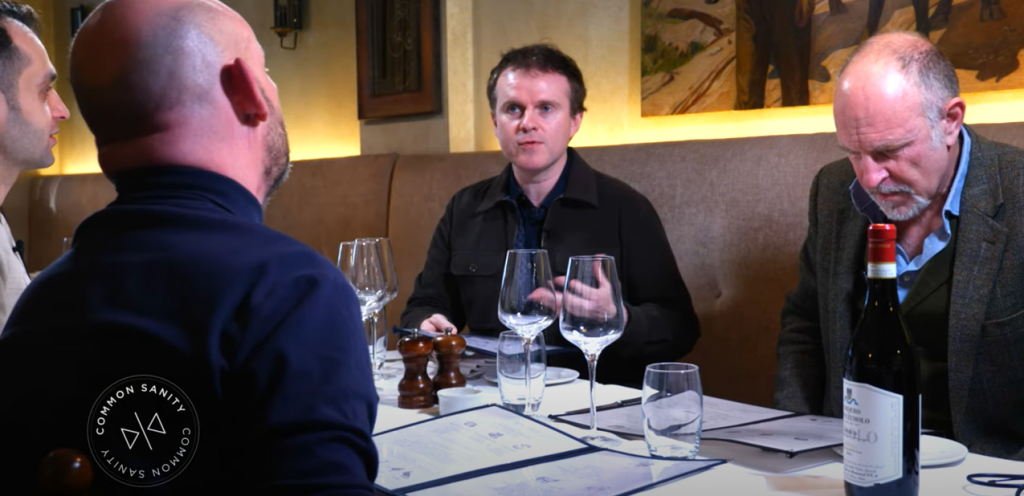
Watch Episode 1 of the new Common Sanity podcast with Andrew Doyle, Simon Evans, Giles Fraser and Konstantin Kisin, filmed pre-lockdown in Il Portico Restaurant in Kensington High Street.














To join in with the discussion please make a donation to The Daily Sceptic.
Profanity and abuse will be removed and may lead to a permanent ban.